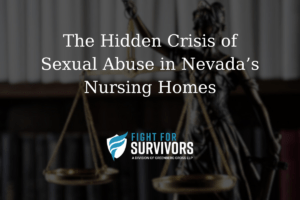
Sexual abuse in nursing homes is a deeply troubling yet often overlooked issue affecting some of the most vulnerable members of society. In Nevada, especially in cities like Las Vegas, reports of abuse, neglect, and physical mistreatment in long-term care facilities continue to rise. Despite efforts to increase funding and improve safety measures, many elderly residents remain at risk due to understaffing, poor oversight, and a lack of accountability.
Understanding Sexual Abuse in Nursing Homes
Sexual abuse in a nursing home occurs when a patient is subjected to unwanted sexual contact or behavior. This type of abuse can be committed by a staff member, another resident, or even visitors to the facility. The victims, often elderly or those with cognitive impairments, may struggle to report the abuse due to fear, confusion, or physical limitations.

Common Forms of Sexual Abuse in Nursing Homes
- Unwanted touching or groping
- Sexual assault or rape
- Forcing a patient to watch or participate in sexual acts
- Taking sexually explicit photographs without consent
- Verbal sexual harassment or threats
The Scope of the Problem in Nevada
Nevada has a growing elderly population, with many individuals relying on nursing homes for long-term care. Unfortunately, many of these facilities suffer from neglect, lack of oversight, and inadequate staffing.
Contact Us For A Free Legal Consultation. No Fee.
Call (833) 55-FIGHTReports of elder abuse, including sexual abuse, have increased in counties across the state. In some cases, abuse goes unreported for weeks or even months due to fear of retaliation, cognitive decline, or a lack of proper investigative procedures within the facility. Studies from national organizations indicate that the true extent of the problem is likely much greater than what is officially reported.
Why Nursing Home Residents Are at Risk
Several factors contribute to the high risk of sexual abuse in nursing homes:
- Vulnerability – Many residents have physical or cognitive impairments that prevent them from defending themselves or reporting abuse.
- Staffing shortages – A lack of caregivers increases the risk of neglect and reduces oversight, creating opportunities for abuse.
- Failure to screen employees – Some nursing homes do not conduct thorough background checks, leading to the hiring of staff members with histories of abuse or misconduct.
- Lack of training – Staff members may not be properly trained to recognize or respond to signs of sexual abuse.
- Institutional neglect – Facilities that prioritize profit over patient care often fail to address complaints, leading to repeated instances of abuse.
Warning Signs of Sexual Abuse in Nursing Homes
Families and caregivers should be aware of potential warning signs that a resident may be experiencing abuse:
- Unexplained injuries, bruises, or bleeding
- Sudden changes in mood, anxiety, or depression
- Fear or avoidance of certain staff members or other residents
- Difficulty sitting or walking
- Torn or stained undergarments
- Sexually transmitted infections with no explanation
- Sudden withdrawal from family and social interactions
If any of these signs are present, it is crucial to report the situation immediately and seek legal assistance.
The Role of Family and Caregivers in Preventing Abuse
Family members and caregivers play a vital role in protecting nursing home residents from abuse. Steps that can be taken include:
- Visiting frequently and at different times of the day to observe conditions in the facility
- Building strong relationships with staff and other residents to ensure accountability
- Encouraging open communication so the patient feels safe discussing concerns
- Reviewing nursing home reports and past violations before choosing a facility
- Reporting any suspicions of abuse to state agencies or law enforcement
Reporting Sexual Abuse in Nursing Homes
In Nevada, there are multiple agencies responsible for investigating nursing home abuse. If a person suspects abuse, they should take the following steps:
- Report the abuse to the nursing home administrator and request an immediate investigation.
- Contact Nevada’s Adult Protective Services to file an official report.
- Report the incident to local law enforcement if the abuse is severe or criminal in nature.
- Seek medical evaluation for the victim to document any physical evidence of abuse.
- Consult with legal professionals to determine the best course of action.
Reports should be detailed and include specific information such as names, dates, times, and descriptions of the abuse.

Legal and Financial Consequences for Perpetrators and Facilities
Nursing homes have a legal duty to protect residents from harm, including sexual abuse. When a facility fails in this duty, it can face serious legal and financial consequences.
- Perpetrators of abuse can face criminal charges, including prison time and fines.
- Facilities that fail to prevent or properly address abuse can be sued for damages.
- Families may be entitled to financial compensation for medical bills, emotional suffering, and other damages.
- If a nursing home is found negligent, it may lose its license or be forced to shut down.
Legal action not only holds abusers accountable but also helps to create safer conditions for other residents.
The Need for More Funding and Stronger Oversight
Despite growing awareness of nursing home abuse, many facilities continue to operate without sufficient oversight. More funding is needed to improve staff training, increase the number of caregivers, and strengthen enforcement of safety regulations. State and national organizations must also push for stronger laws to protect nursing home residents and hold facilities accountable for failing to prevent abuse.
Resources for Victims and Families
Victims of nursing home abuse and their families can find support through various organizations, including:
- The National Center on Elder Abuse, which provides education and resources on recognizing and reporting abuse
- Local law enforcement agencies that investigate reports of abuse
- Legal aid organizations that offer assistance in pursuing civil claims
- Support groups for survivors of elder abuse and their families
If you suspect that a loved one has been abused in a nursing home, do not wait to take action. Reporting abuse and seeking legal assistance can help prevent further harm and ensure that the victim receives the justice and care they deserve.
Experienced Attorneys Who Will Listen And Fight For You
Speak To An Attorney Now »